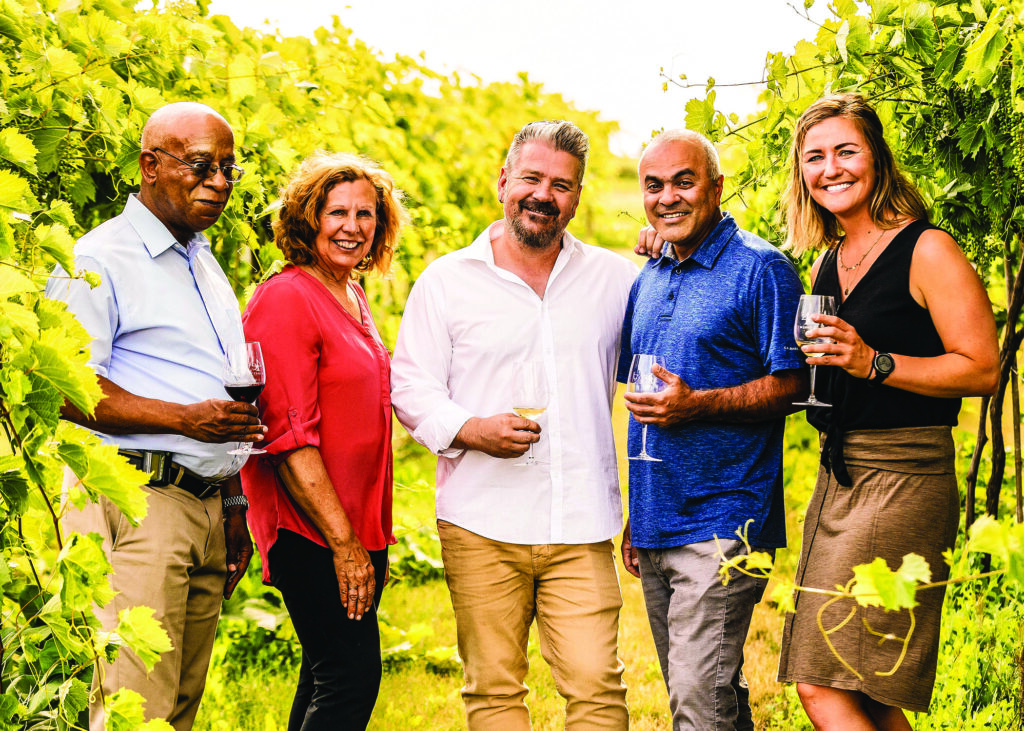
Megan Myrdal (at right) and the collaborators on the new book “Midwest Mediterranean” celebrated its publication last fall at a local winery. From left: David Clardy, MD; Noreen Thomas; Peter Schultz; Fadel Nammour, MD; and Myrdal. (Photo/M Schlief Photography.)
Nancy Edmonds Hanson
What do the sunny shores of the Mediterranean Sea have to teach hardy souls of the American Midwest? Quite a lot, it turns out – about good health and good eating.
Dietitian Megan Myrdal and her co-editor Peter Schultz have gathered highlights of that 5,000-mile connection in “Midwest Mediterranean,” a new book that’s a cross between a cookbook and a short course in the bountiful benefits of a way of eating that combines the tasty agricultural products of the Red River Valley with the practical wisdom of ancient Greek and Italian cultures.
Subtitled “Finding Health and Flavor with the Foods of the North,” their collaboration – along with physicians David Clary and Fadel Nammour, organic farmer Noreen Thomas and Schultz’s psychotherapist brother William – has produced an upbeat prescription for amending the local diet of beef and potatoes with healthier alternatives. Long on whole grains, legumes (dry beans, peas and lentils), fresh vegetables and the magic ingredient, top-quality cold-pressed Grecian olive oil, they make a case for Midwest-accented Mediterranean dining habits.
It’s part of Megan’s life mission to “celebrate, empower and connect the local food community and beyond,” as her organization Food of the North proclaims in its mission statement. Founded along with Gia Rassier and Jeff Knight in 2015, the little nonprofit set out to tackle food waste; up to 40% of the nation’s food production is said to be wasted during harvesting, processing and purveying it to consumers.
That educational campaign evolved. In 2016, the three initiated the Little Free Gardens that dot front yards in 26 states. The next step: First Fridays, monthly networking meetings to connect the area’s food producers (from gardeners to farms), chefs, educators and other members of the foodie community.
And connect they did. After Megan and Peter shared a demonstration that combined his imported olive oil from the Mistras Valley of Greece with her promotion of the area’s beans and lentils, he had a brainstorm: “We have a book here!” Over the next year or two, they reached out to cardiologist Clardy, who had addressed a First Friday about heart-healthy eating, and gastroenterologist Nammour, whose clinical practice focuses on gut health and the human biome. (The biome includes billions of microbes that inhabit the body, especially the digestive system.)
Peter explains the Mediterranean diet’s impact on health: First recognized by Minnesota physiologist Ancel Keys in the early 1970s, it suggests that the long lives and good health of people of the Mediterranean is owed to their diet: long on plant-based foods, fish and poultry; light on red meat and processed foods; and dressed with mono- and polyunsaturated fats in the form of olive oil. “It’s more than a diet,” he writes. The word ‘diet’ translates from the Greek, he explains, as something more like “way of life” or lifestyle.
“Midwest Mediterranean” covers all this and much more in easy, readable essays. Clardy writes of evidence that heart health can be substantially improved through this style of eating. Nammour lays out new evidence that the digestive system functions rather like a second brain, working with the better-known organ to support the immune system, aid metabolism, reduce brain fog and improve general stamina and health. He posits that Mediterranean-style eating promotes healthy microbes in the gut.
Psychotherapist Schultz introduces the growing study of nutritional psychiatry, with healthy dining habits linked to reducing anxiety and depression. Thomas, who farms north of Moorhead, discusses how nutritious whole grains like organically raised oats not only make superior impact on health but also simply taste good.
No matter how persuasive their evidence, though, Megan says the team realized that no book of erudite essays could slide their neighbors from hot dishes to healthier meals without providing a bevy of tempting how-tos. “To translate ideas into action, you need recipes to put them into practice,” she says. She and Peter contacted area chefs and home cooks to gather the recipes that are at the heart of their book – Mediterranean dishes for the High Plains that not only score big on the health front but are downright delicious.
And so Megan contributed her own Midwest Mediterranean Bean Salad. It includes less familiar staples like couscous, kalamata olives, feta cheese and olive oil, but also three kinds of beans (red kidney, cannellini and garbanzo) but cucumbers, kale, cherry tomatoes, onion and a cup of chopped parsley, mint and basil. “Everyone who has tasted it goes wild for it!” she confides.
Peter, who leads annual summer expeditions to his beloved Greece, adds his formula for the Ultimate Greek Salad. Other recipes include Andrea Baumgardner’s Squash and Apple Tabbouleh; Sara Nasello’s Triple Olive Dip; and a dozen more, wrapping up with Terri Trickle’s Blackboard Olive Oil Lemon Bundt Cake with Lemon Curd and Lavender Cream Cheese Icing.
The softcover book is available at Zandbroz Variety, Creative Kitchen and Ferguson Books, and may also be ordered online at amazon.com.


